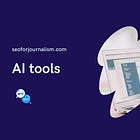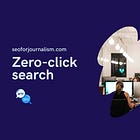🎟️ Giveaway to NESS! | Ask a News SEO with Barry Adams and John Shehata
We have FIVE (5) free NESS tickets. Click open for details.
Hello, and welcome back. Jessie and Shelby here, back from winning the third-straight championship at The Globe and Mail’s annual softball tournament!! Neither of us have worked for The Globe in years … but we love softball, our former colleagues and a free lunch!
This week: A special Ask a News SEO interview with co-founders of the News and Editorial SEO Summit (NESS), Barry Adams and John Shehata. We chat about the future of AI and search, the can’t-miss NESS talks and how to make the most of the conference.
ALSO! We’re thrilled to be partnering with NESS — again! — to give away tickets to this year’s conference. We have FIVE (5) free tickets for NESS. Scroll to the end of this email for details about the giveaway.
Let’s get it.
THE INTERVIEW
WTF is SEO?: Let’s talk about AI and the changing news SEO landscape. What do you think are the biggest threats and opportunities that you see for publishers?
John Shehata: AI is both a disruptor and an accelerator. Like anything else, it has good and bad.
We all know the way it’s impacting traffic and getting clicks. But if you look at the accelerator part of it, AI can really help newsrooms be faster with so many tasks, like content analysis of financial reports — or if there’s a document leak, analyzing hundreds of pages very quickly. It’s also useful for repetitive SEO or audience tasks.
Barry Adams: I think some publishers sort of jumped on AI as the underlying reason for their traffic is going down and very conveniently forgot that traffic had been going down before AI.
Publishers are not taking responsibility for creating shitty websites with shitty experiences full of pop-ups, advertising and other commercial bullshit rather than focusing on the core output of journalism and creating something of value to readers.
So AI, yes, threatens a certain part of content generation. But if you’re confident in your journalism, you should not be afraid. The more I look at websites that have been affected by traffic losses, the more I realize they probably deserve it. They should rethink their approach to their content, which is a hard conversation and not something publishers often want to hear.
WTF is SEO?: That is a hard conversation for a lot of publications. How would you suggest SEO editors have that conversation internally?
Barry Adams: If I’m entirely honest, if it’s a conversation the SEO people have to initiate, it’s never going to go anywhere. It needs to emerge from leadership. You can plant seeds as someone working in the trenches, so that they start thinking they need to change.
But it’s always very ironic to me: In the fast-moving world of news and publishing, organizations are typically very slow to change. They are entrenched in their ways of working. It’s like changing the direction of an oil tanker — it’s not going to happen soon. You need to start nudging that oil tanker in the right direction as much as possible.
Younger, fresher publications have a leg up here. They tend to be more nimble. But, change has to come from leadership. I’ve seen this too many times before where a publisher still behaves like it’s 1975.
John Shehata: I agree with Barry. Newsrooms and organizations have to differentiate between the product and the medium. The product is news. The medium is ever-changing. It was newspapers, then websites, then websites with AI. Maybe in the future it will be holograms. It’s always changing and the revenue models need to change with the different mediums.
WTF is SEO?: In an AI world, we really do have to go back back to basics. What do publishers need to think about to make sure our sites are structured for LLMs?
Barry Adams: Christine Liang and I are doing a joint presentation on technical SEO with a focus on how you get your content into the LLMs. A lot of it is classic technical SEO; there’s not a lot of difference there.
If anything, it’s even simpler because the LLMs don’t look for things that Google sometimes looks for. A lot of people say you need structured data. Most LLMs strip all of that out. They just look for words on the page — but it does mean you need words on the page.
You need to think about site structure — how easy it is to find deeper, older pages. In the world of LLMs, volume matters. Getting more content indexed by LLMs is better, which means your archive needs to be accessible and easily findable — not 55 clicks from the homepage.
This is old school pagination. Site architecture and find-ability are important. You can use clicks from the homepage as a sort of metric. Ideally, you should get to nearly every article within five clicks from your homepage. It is not actually that difficult to implement if you’re smart about it.
John Shehata: And if you think about the content, it’s about going back to basics and having well-structured content. We have been saying forever to use <H2>s in your articles to separate different paragraphs and ideas. The idea of chunking content and the inverted pyramid style of writing — the most important and relevant information at the top — helps LLMs to understand the content better.
WTF is SEO?: If you’re a publication that’s worried about AI/traffic loss, who are the main speakers you should look forward to at NESS?
Barry Adams: Mike King always has interesting things to say about the future of SEO, even if I think sometimes he’s wrong. Harry Clarkson-Bennett will have an interesting session about revenue. Lily Ray is always worthwhile. She’s going to be talking about affiliate content; the reputation abuse policy killed off a big revenue channel for a lot of publishers. It will be interesting to see what that’s going to look like and if publishers can survive without it.
John Shehata: James Carson will be talking about building AI agents to help SEO teams in news organizations be more efficient and faster. Marie Haynes will be talking in general about AI beyond websites. Dixon Jones will drill into entity optimization, a core concept of not just Google Discover and Search, but LLMs now, too.
Barry Adams: The panel sessions — especially on the second day — like the ask a news SEO and the future of SEO panels. You can ask the speakers and the panelists directly where search is heading and how to maximize traffic, revenue and how to get ready for the next phase of the web.
WTF is SEO?: What talks are you personally keen on?
Barry Adams: I’m really looking forward to Steve Wilson-Beales, who is going to be talking about the YouTube algorithm. You might be wondering, why do we have a YouTube session at a SEO conference? It’s because YouTube also has a search algorithm that’s worth optimizing for.
Multimodal multimedia content is something that should be all over because it helps immunize yourself against Google — especially because YouTube never seems to lose in Google algorithm updates.
Short- or long-form video, all that sort of stuff is great. YouTube has great monetization opportunities. [Publishers should] present news to your audience where they tend to go, and in the format that they want to consume. I’m really looking forward to that talk.
John Shehata: I’m looking forward to Mike King. He always brings a very interesting perspective and digs deep into the data. Maddie Shepherd will be talking about the rise of zero-click searches and how to earn a click.
WTF is SEO?: What are your top tips for people about getting the most out of the conference?
John Shehata: The hardest part about in-person conferences is that you can’t send a lot of people. You depend on the person bringing the knowledge back to the organization. NESS is affordable. Organizations can send a lot of people and more people can benefit. And the sessions are recorded and you can go back and rewatch.
Barry Adams: If you work for a larger organization, I am a fan of summarizing a few key sessions in your own presentation for your team or key stakeholders. That tends to land the message quite well as well. It also helps you digest what you learned and present it in a meaningful way.
Even though NESS is an online conference, there are networking opportunities. You can sit in the networking rooms between sessions or send direct messages to people. The most value I get from conferences is not necessarily what I learned from the talks, but the people I meet and have great conversations with. That goes on beyond the conference. It allows me to build a network of people I can ask questions and learn from. That’s something that will help you throughout your whole SEO career and beyond. Definitely make use of the networking opportunities.
Here’s how to enter our NESS giveaway 🎉
Be a member of our Slack community.
Contest ends October 15, 2025 at 11:59 p.m. ET. Winners will be announced on the SEO is Journalism Slack and contacted via email.
NESS will run October 21 and 22, 2025. All event details can be found on their website.
THE JOBS LIST
Audience or SEO jobs in journalism. Want to include a position for promotion? Email us.
The Washington Post is hiring a Head of AI Discovery & SEO (D.C., or N.Y.).
RECOMMENDED READING
Google news and updates
🤖 Google: The August 2025 spam update has finished rolling out.
🤖 Barry Schwartz: Google’s AI Mode is rolling out more travel-specific features.
🤖 Google is testing AI Overviews with citation cards.
🤖 Google is updating its ad misrepresentation policy for dishonest pricing.
Even more recommended reading
⌨️ Harry Clarkson-Bennett: How people really use LLMs and what that means for publishers.
⚽ Francine Monahan: AI Mode impacts on publishing: Researching local news and sports headlines.
🧑💻 Gianluca Fiorelli and Ian Lurie: How to build value and measure lift in an AI world.
⏳ Deena Mousa: The algorithm will see you now.
👻 Alice Brooker: ChatGPT is ‘ghost’ of what publishers provide directly.
What did you think of this week’s newsletter?
(Click to leave feedback.)
Catch up: Last week’s newsletter
Have something you’d like us to discuss? Send us a note on Twitter (Jessie or Shelby) or to our email: seoforjournalism@gmail.com.
Written by Jessie Willms and Shelby Blackley






